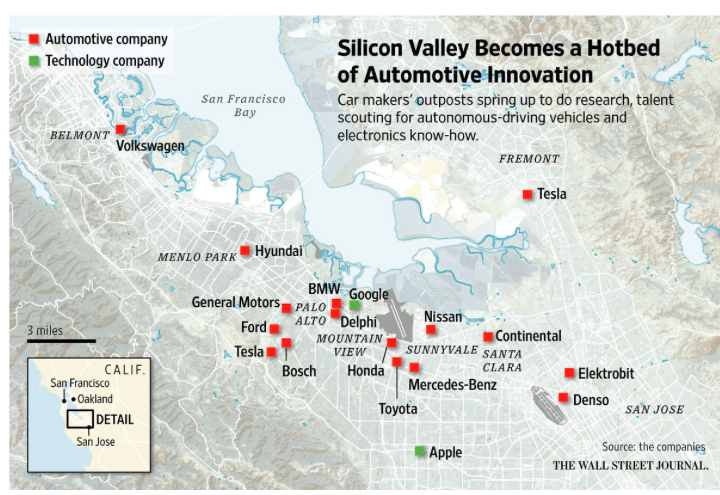The first quarter of 2016, in particular the past month, has seen an influx of M&A activity, investment and news regarding the development of the autonomous vehicle industry in the USA. Toyota, GM and other large car manufacturers around the world have stepped up in the race against Google and other tech innovation firms to make progress in the search for a perfect self-driving car.
Automakers and car-part suppliers all over the globe have combined or began competing with tech-startups in recent years to boost their connectivity, as well as their R&D for autonomous vehicles. Consultants at PricewaterhouseCoopers LLP estimate 2015 merger-and-acquisition activity by automotive suppliers reached nearly $50 billion, more than three times the prior year. The industry’s need for new capabilities is helping fuel the spending.

GM recently stepped up to the competitive industry by purchasing a San Francisco based company, Cruise Automation that has developed a system to retrofit in existing vehicles with autonomous driving software. According to people familiar with the matter, the deal is valued north of $1 billion in cash and stock. The acquisition provides GM with a team of sophisticated engineers, who can help speed up efforts. GM has made a series of moves to prepare for the transition. Its portfolio of vehicles with semi-autonomous features has grown, and it is expected to launch in 2017 a more-advanced version of Super Cruise, a system that allows for hands-free driving on highways.
Other companies such as Toyota have been keeping up the pace in an increasingly competitive environment, too. Earlier this month, Toyota recruited the staff at a small Massachusetts based autonomous vehicle company to work on its advanced projects. The move was to enable it to speed up R&D. Toyota last year pledged to invest $1 billion into artificial intelligence research, with a big focus on autonomous vehicles.
It’s not just the big boys leading this research though – a massive amount of progress is dependent on small startups that are competing with the likes of Google, Tesla and others to grab a piece of the driverless car market. Subtly, over the last 4-5 years, startups have been capitalizing on low equipment cost and easily accessible software to carve out niches in the industry – retrofitting vehicles, looking at applications in fields such as farming and military rather than the commercial market, etc.
“It shows the innovation in this field isn’t limited to big R&D budgets,” Mr. Koslowski, a senior automotive analyst at Gartner says. “What’s happening right now in the automotive industry is a complete transformation of mobility,” says Bobby Hambrick, chief executive of AutonomouStuff, which he says has more than 1,000 customers. “For the first time in history for the automotive industry, five guys in a garage can make a huge impact on the industry.” The increasing role of startups in the industry aptly explains the exponentially increasing M&A activity in the field.
The first quarter of 2016, in particular the past month, has seen an influx of M&A activity, investment and news regarding the development of the autonomous vehicle industry in the USA. Toyota, GM and other large car manufacturers around the world have stepped up in the race against Google and other tech innovation firms to make progress in the search for a perfect self-driving car.
Automakers and car-part suppliers all over the globe have combined or began competing with tech-startups in recent years to boost their connectivity, as well as their R&D for autonomous vehicles. Consultants at PricewaterhouseCoopers LLP estimate 2015 merger-and-acquisition activity by automotive suppliers reached nearly $50 billion, more than three times the prior year. The industry’s need for new capabilities is helping fuel the spending.

GM recently stepped up to the competitive industry by purchasing a San Francisco based company, Cruise Automation that has developed a system to retrofit in existing vehicles with autonomous driving software. According to people familiar with the matter, the deal is valued north of $1 billion in cash and stock. The acquisition provides GM with a team of sophisticated engineers, who can help speed up efforts. GM has made a series of moves to prepare for the transition. Its portfolio of vehicles with semi-autonomous features has grown, and it is expected to launch in 2017 a more-advanced version of Super Cruise, a system that allows for hands-free driving on highways.
Other companies such as Toyota have been keeping up the pace in an increasingly competitive environment, too. Earlier this month, Toyota recruited the staff at a small Massachusetts based autonomous vehicle company to work on its advanced projects. The move was to enable it to speed up R&D. Toyota last year pledged to invest $1 billion into artificial intelligence research, with a big focus on autonomous vehicles.
It’s not just the big boys leading this research though – a massive amount of progress is dependent on small startups that are competing with the likes of Google, Tesla and others to grab a piece of the driverless car market. Subtly, over the last 4-5 years, startups have been capitalizing on low equipment cost and easily accessible software to carve out niches in the industry – retrofitting vehicles, looking at applications in fields such as farming and military rather than the commercial market, etc.
“It shows the innovation in this field isn’t limited to big R&D budgets,” Mr. Koslowski, a senior automotive analyst at Gartner says. “What’s happening right now in the automotive industry is a complete transformation of mobility,” says Bobby Hambrick, chief executive of AutonomouStuff, which he says has more than 1,000 customers. “For the first time in history for the automotive industry, five guys in a garage can make a huge impact on the industry.” The increasing role of startups in the industry aptly explains the exponentially increasing M&A activity in the field.
